
calculation a complete guide for tournament players
Calculation is a cornerstone of chess strategy, essential for tournament players to outmaneuver opponents. This guide provides a comprehensive approach to mastering calculation techniques, ensuring precise decision-making and strategic excellence in competitive play.
1.1 The Importance of Calculation in Chess
Calculation is fundamental to chess, enabling players to transform analysis into actionable results. It allows precise evaluation of moves, ensuring decisions align with strategic objectives. Strong calculation skills prevent oversights and capitalize on tactical opportunities. Grandmasters excel by calculating deep sequences, often 15 moves ahead, distinguishing elite play. The guide by CM Azel Chua emphasizes systematic approaches, enhancing clarity and confidence. For tournament players, mastering calculation is crucial, as it directly impacts performance under pressure. This skill bridges analysis and execution, making it indispensable for competitive success. By refining calculation, players elevate their game, avoiding costly errors and securing victories in critical moments.
1.2 Why Tournament Players Need Strong Calculation Skills
Tournament players require robust calculation skills to excel in high-stakes environments. Accurate calculation ensures precise move evaluation, preventing blunders and maximizing tactical opportunities. It enables players to foresee consequences, adapt strategies, and maintain composure under time pressure. A systematic approach, as taught in CM Azel Chua’s guide, enhances decision-making clarity. Strong calculation distinguishes top performers, allowing them to outmaneuver opponents and capitalize on subtle advantages. For club and tournament players, this skill is vital for converting promising positions into wins. By mastering calculation, players build resilience and confidence, essential for overcoming psychological barriers and achieving consistent success in competitive play.
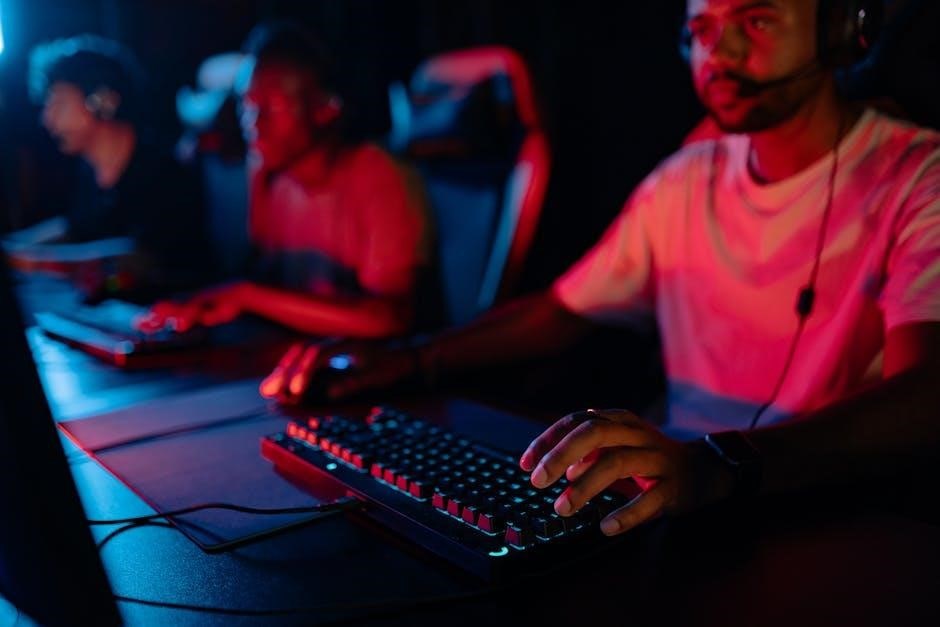
Understanding Basic Calculation Principles
Mastering basic calculation principles is fundamental for chess success. It involves visualizing moves, evaluating tactics, and understanding strategic concepts. These skills form the foundation of precise play.
2.1 What is Calculation in Chess?
Calculation in chess refers to the process of analyzing possible moves, their outcomes, and the resulting positions. It involves evaluating tactics, strategies, and potential threats. Strong calculation skills enable players to predict opponent moves, identify weaknesses, and execute winning plans. For tournament players, precise calculation is crucial for outmaneuvering competitors and achieving strategic goals. It combines logical reasoning, pattern recognition, and foresight. Grandmasters often calculate multiple moves ahead, anticipating complex sequences. This skill distinguishes elite players and is essential for success in competitive chess. By mastering calculation, players can enhance their decision-making and control the game’s flow effectively.
2.2 Types of Calculation: Tactical vs. Strategic
In chess, calculation can be categorized into two main types: tactical and strategic. Tactical calculation focuses on short-term goals, such as capturing pieces, delivering checkmate, or exploiting immediate weaknesses. It involves analyzing forced sequences, combinations, and direct threats. Strategic calculation, on the other hand, deals with long-term plans, such as positioning pieces, controlling key squares, or creating enduring advantages like pawn structures or open lines. Both types are essential for tournament players, as they complement each other in achieving victory. Tactical calculation addresses immediate opportunities, while strategic calculation shapes the game’s direction. Mastering both ensures a well-rounded approach to competitive play, enabling players to adapt to various situations effectively.
2.3 The Role of Visualization in Calculation
Visualization is a critical component of chess calculation, enabling players to mentally simulate positions and outcomes without physically moving the pieces. It allows tournament players to anticipate potential moves, evaluate consequences, and plan strategies more effectively. By visualizing the board, players can better understand spatial relationships, piece dynamics, and tactical possibilities. Strong visualization skills also enhance pattern recognition, helping players recall similar positions and apply proven strategies. Regular practice, such as solving puzzles or rehearsing games, improves this ability. Visualization is not just about seeing moves but also about understanding their implications, making it an indispensable tool for accurate and efficient calculation during competition.
The Calculation Process for Tournament Players
The calculation process involves assessing positions, planning strategies, and evaluating risks. It requires precise analysis of variations, adapting to changing dynamics, and making informed decisions efficiently.
3.1 Step-by-Step Guide to Calculating Variations
To calculate variations effectively, start by identifying the position’s key elements, such as piece placement and potential threats. Next, visualize the board and predict possible moves for both sides. Evaluate each variation systematically, focusing on tactical motifs like forks, pins, and skewers. Assess the resulting positions for material gains or strategic advantages. Prioritize lines that offer clear benefits and discard those that lead to unnecessary complexity. Use mental landmarks to track progress and avoid time-wasting loops. Finally, select the variation that maximizes your chances of success while minimizing risks. Practice this method to enhance accuracy and decision-making under pressure.

3.2 How to Analyze Positions Accurately
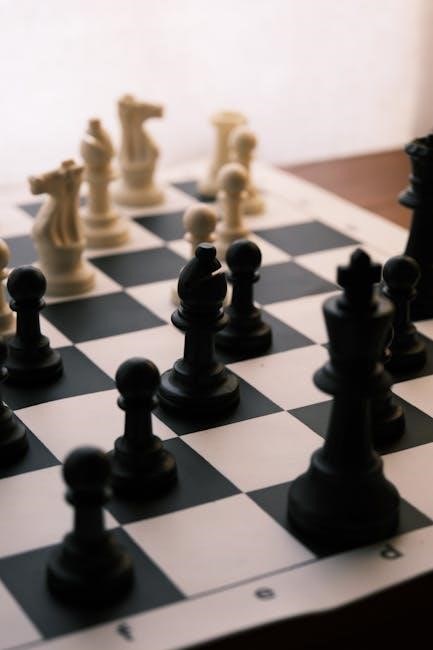
Accurate position analysis is crucial for tournament players to make informed decisions. Start by evaluating material balance, pawn structure, and piece placement. Assess control of key squares and files, as well as mobility and coordination between pieces. Identify weaknesses like undefended pieces or vulnerable pawns. Consider strategic factors such as king safety and long-term plans. Use tools like chess engines or diagrams to verify your assessments. Practice recognizing patterns and typical positions to improve intuition. Always question your assumptions and double-check critical lines. This systematic approach ensures clarity and precision, helping you uncover hidden threats or overlooked opportunities. Regular practice sharpens your analytical skills, leading to better decision-making during games.
3.3 Avoiding Common Mistakes in Calculation
To improve calculation accuracy, tournament players must avoid common pitfalls. One major mistake is rushing through variations without double-checking critical moves. Neglecting to consider opponent’s responses or overlooking simple tactical motifs can lead to costly blunders. Another error is fixating on a single line of play while ignoring alternative possibilities. Time management is also crucial; spending too much time on one variation can lead to missed opportunities elsewhere. Players should practice calculating quietly and systematically, using mental checklists to ensure all possibilities are covered. Regular review of past games can help identify recurring errors. By addressing these habits, players can refine their calculation skills and make more precise decisions at the board.
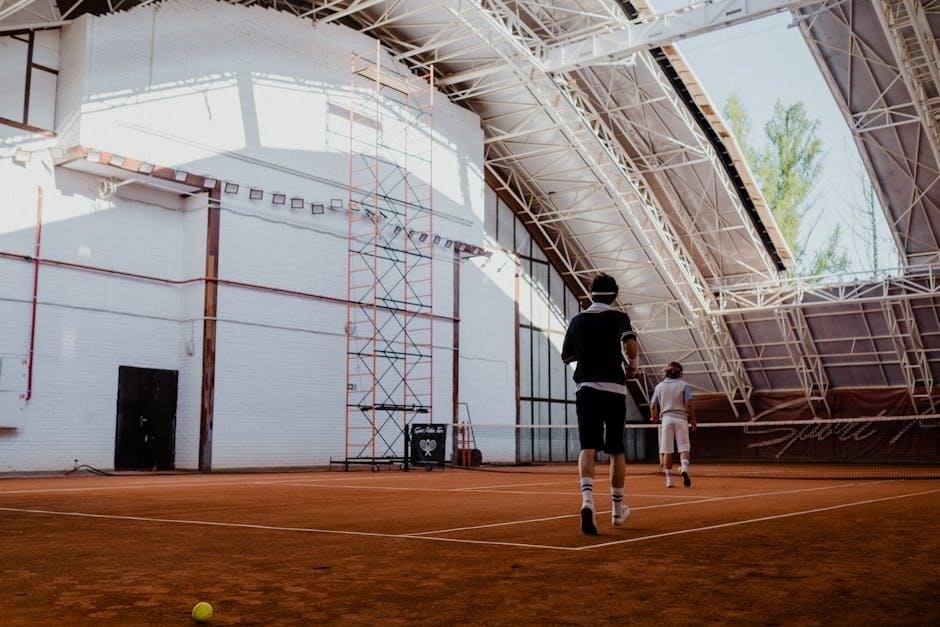
Advanced Calculation Techniques
Advanced Calculation Techniques involve multi-move planning and pattern recognition, enabling players to anticipate opponents’ strategies, execute precise maneuvers, and enhance decision-making under pressure.
4.1 Pattern Recognition and Intuition
Pattern recognition and intuition are critical components of advanced calculation techniques. Experienced players develop the ability to identify familiar tactical and strategic motifs, such as forks, pins, and discovered attacks, allowing for quicker decision-making. Intuition, honed through extensive study and practice, enables players to anticipate potential threats and opportunities without exhaustively calculating every possibility. By recognizing recurring patterns, such as pawn structures or piece placements, players can make more accurate assessments of positions. This skill is particularly valuable in complex scenarios where time is limited. Grandmasters often rely on intuition to guide their calculations, making it a cornerstone of their success in high-pressure tournament environments.
4.2 Calculating Endgame Scenarios
Calculating endgame scenarios requires precise evaluation of simplified positions, often involving fewer pieces. Players must accurately assess whether a small advantage can be converted into a win. Key skills include identifying pawn promotion opportunities, king activity, and opposition play. Practical exercises, such as solving endgame studies, sharpen these abilities. Time management is crucial, as endgames demand careful planning. Using chess software to analyze endgame tables and common positions can enhance accuracy. Mastery of basic endgame principles, such as king and pawn versus king, is essential. Strong endgame calculation skills often determine tournament outcomes, making them a vital focus for improving players.
4.3 Multi-Move Calculation and Planning
Multi-move calculation involves planning several moves ahead, anticipating responses, and adjusting strategies accordingly. This advanced skill requires players to evaluate positions after a series of moves, ensuring long-term strategic goals align with tactical execution. Key techniques include visualizing the board, identifying critical forks, and prioritizing threats. Breaking down complex scenarios into smaller, manageable parts simplifies the process. Players must also balance calculation depth with time management, avoiding excessive analysis of less relevant lines. Incorporating multi-move planning into daily study, such as solving complex puzzles or reviewing master games, strengthens this ability. Mastery of multi-move calculation enhances overall tournament performance by enabling players to outmaneuver opponents systematically.
Training Methods for Improving Calculation
Effective training involves solving tactical puzzles, analyzing master games, and practicing endgame scenarios. Regular study enhances pattern recognition, accuracy, and speed, ensuring tournament readiness and improved results.
5.1 Practical Exercises for Sharpening Skills
Practical exercises are essential for improving calculation skills. Start with tactical puzzles, focusing on themes like forks, pins, and skewers. Solve endgame drills to master basic positions. Analyze annotated grandmaster games to understand their decision-making processes. Incorporate blindfold chess exercises to enhance visualization. Practice calculating variations by setting up positions and exploring all possible lines. Use time-based exercises to simulate tournament conditions, ensuring quick yet accurate decisions. Regularly review missed opportunities in your own games to identify calculation errors. These exercises build pattern recognition, precision, and speed, transforming calculation into a reliable weapon during competition.

5.2 Using Chess Software and Tools
Chess software and tools are invaluable for improving calculation skills. Engines like Stockfish or Leela Chess Zero can analyze positions and reveal missed tactical opportunities. Tactical trainers, such as Chess.com’s Puzzle Rush or Lichess’s Tactics Trainer, provide focused exercises to sharpen quick decision-making. Chessbase and Chess.com offer extensive game databases, allowing players to study master games and observe calculation in action. Tools like ChessTempo or Chess24 provide interactive drills and live analysis features. Additionally, video analysis software can help review games and pinpoint calculation errors. These tools enhance pattern recognition, accuracy, and speed, making them indispensable for tournament preparation. Regular use complements practice and accelerates skill development.
5.3 Incorporating Calculation into Daily Study
Incorporating calculation into daily study is essential for consistent improvement. Dedicate a portion of your study time to solving tactical puzzles, which reinforce pattern recognition and quick decision-making. Review master games, focusing on how players calculate and execute plans. Practice annotating your own games to identify calculation errors and missed opportunities. Allocate time for endgame studies, as these scenarios often require precise calculation. Set aside moments for blindfold chess exercises to strengthen visualization skills. Consistency is key; even short daily sessions can lead to significant progress over time. By integrating these practices, players develop a habit of calculating accurately and efficiently, preparing them for tournament success.
Calculation in Real-World Tournament Scenarios
Calculation is critical in tournament play, where time constraints and psychological pressure intensify. Players must apply their skills swiftly, balancing accuracy with efficiency under stress. Real-life examples highlight how precise calculation often decides game outcomes, making it a cornerstone of competitive success.
6.1 Applying Calculation in Time Pressure Situations
In tournament play, time pressure is inevitable, and players must apply calculation efficiently. Under the clock, prioritizing critical lines and avoiding unnecessary depth is essential. Techniques like focusing on forcing moves, such as checks and captures, help manage time effectively. Players should also train to recognize patterns quickly, reducing the need for exhaustive analysis. Time pressure demands a balance between accuracy and speed, often requiring players to make practical decisions rather than seeking perfect moves. Strong calculation skills enable players to navigate these situations confidently, ensuring they maximize their chances even when time is scarce.
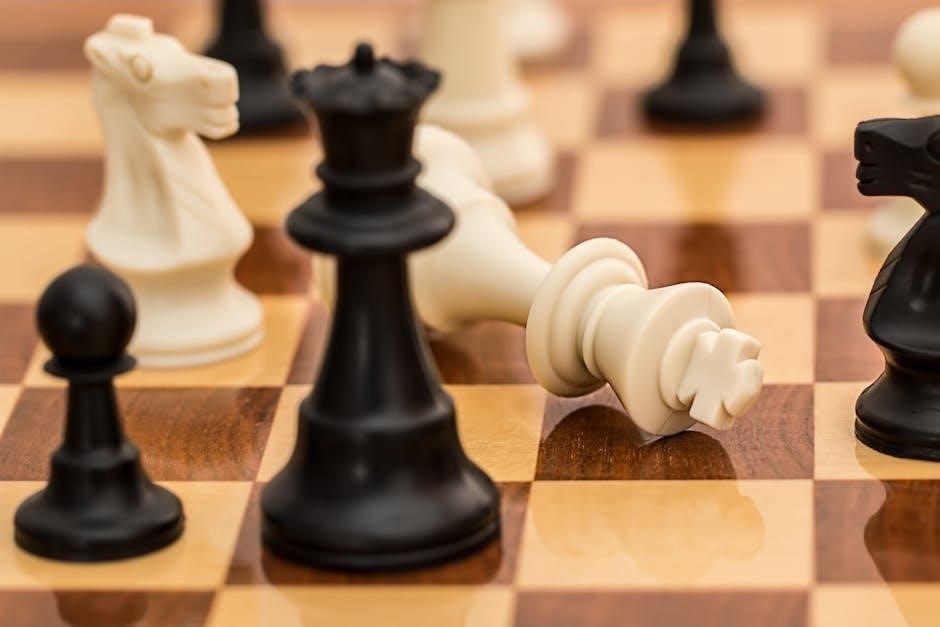
6.2 Handling Psychological Pressure During Games
Psychological pressure during games can significantly impact a player’s ability to calculate effectively. Anxiety, fear of losing, or fear of making mistakes can cloud judgment and reduce focus. To manage this, players should employ mental techniques such as mindfulness, deep breathing, or visualization to stay calm. Maintaining a positive mindset and focusing on the process rather than the outcome helps alleviate pressure. Additionally, pre-game preparation and mental rehearsal can build resilience; Experienced players often develop routines to stay grounded, ensuring they remain composed even in high-stakes situations. Managing psychological pressure is as crucial as calculation skills themselves, as it directly influences decision-making and performance quality during games.
6.3 Post-Game Analysis for Improving Calculation
Post-game analysis is a vital tool for improving calculation skills. By reviewing games, players can identify missed opportunities, calculation errors, and strategic oversights. Using chess software or working with a coach can provide deeper insights. Key moments in the game should be examined to understand where calculation could have been more precise. This process helps refine decision-making and strengthens pattern recognition. Players should focus on objective analysis rather than emotional reactions, aiming to learn from mistakes. Regular post-game review fosters a growth mindset, enabling consistent improvement in calculation and overall performance. It also builds confidence for future games by addressing weaknesses systematically.
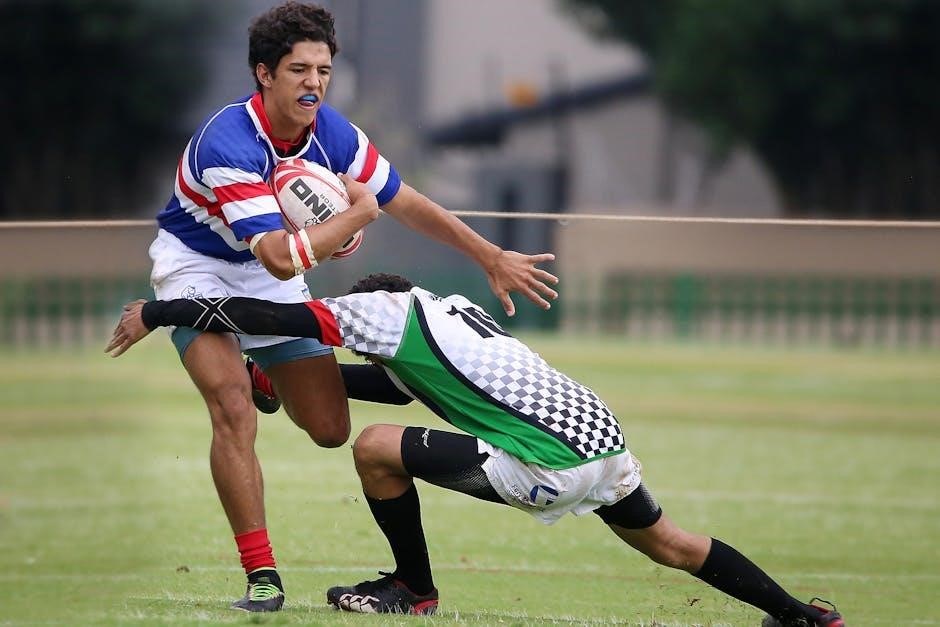
Expert Insights and Case Studies
Learners gain valuable insights by studying grandmasters’ calculation techniques and analyzing real tournament games, providing practical lessons and inspiration for improving their skills effectively.
7.1 Learning from Grandmasters’ Calculation Techniques
Grandmasters’ calculation techniques offer invaluable lessons for tournament players. They emphasize precise visualization, pattern recognition, and endgame expertise. Players like Magnus Carlsen and Garry Kasparov demonstrate exceptional ability to calculate multiple moves ahead, even in complex positions. Their methods include breaking down positions into manageable parts, focusing on key tactical motifs, and employing mental checkpoints to avoid errors. Studying their games reveals how they handle time pressure and psychological stress, maintaining clarity under intense conditions. By analyzing their thought processes and decision-making, players can adopt similar strategies to enhance their calculation skills and improve overall performance in competitive play.
7.2 Real-Life Examples of Calculation in Tournament Play
Real-life examples of calculation in tournament play highlight how top players navigate complex positions. For instance, Bobby Fischer’s 1972 World Championship match featured remarkable calculation, as seen in his iconic 29…Bxg2+ sacrifice. Similarly, Garry Kasparov’s 1985 game against Anatoly Karpov showcased his ability to calculate multiple variations under time pressure. Modern players like Magnus Carlsen demonstrate calculation prowess in endgames, such as his 2013 victory over Viswanathan Anand. These examples illustrate how precise calculation leads to decisive results. By studying such games, players can gain insights into handling pressure, managing time, and executing intricate plans effectively.
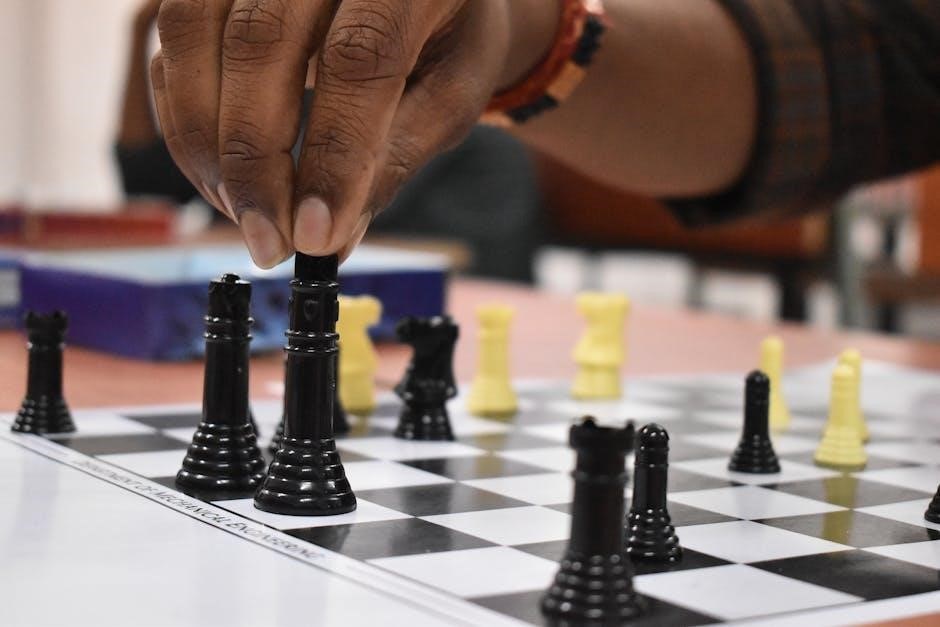
7.3 Continuous Improvement Through Study and Practice
Continuous improvement in calculation requires consistent study and practice. Players should regularly analyze master games, focusing on how grandmasters calculate variations and make decisions. Breaking down complex positions into smaller parts helps build analytical skills. Incorporating endgame studies and tactical puzzles into daily routines sharpens precision. Using chess software to simulate tournament scenarios and track progress is highly effective. Reviewing mistakes from past games is crucial for identifying weaknesses. Over time, this disciplined approach enhances intuition and calculation speed. The key is to stay persistent, as mastery of calculation is a long-term process that demands dedication and a systematic approach to learning.
Mastering calculation transforms a player into a formidable competitor. This guide has journeyed from basic principles to advanced techniques, emphasizing consistent practice and study as the pathway to tournament success.
8.1 Summarizing Key Takeaways

Mastering calculation is essential for tournament success, requiring a blend of skill, strategy, and practice. Key takeaways include understanding basic principles like visualization and analysis, distinguishing between tactical and strategic thinking, and refining advanced techniques such as pattern recognition and multi-move planning. Training methods, including practical exercises and chess software, are vital for improvement. Consistent study and real-world application in tournaments build confidence and precision. By integrating these elements, players can elevate their calculation skills, leading to better decision-making and results in competitive play. Remember, calculation is a skill that improves with dedication and deliberate practice, making it a cornerstone of chess mastery.
8.2 The Path to Mastering Calculation for Tournament Success
Mastery of calculation in chess requires dedication, systematic practice, and a well-structured approach. Begin by breaking down complex concepts into manageable parts, focusing on visualization and accurate analysis. Regularly practice tactical exercises and endgame scenarios to sharpen skills. Utilize chess software to simulate real-game situations and track progress. Apply these skills in tournament play, learning from successes and setbacks. Persistence and continuous improvement are key, as calculation becomes second nature over time. By following this path, players can develop the precision and confidence needed to excel in competitive environments, ultimately achieving tournament success through calculated decisions and strategic thinking.